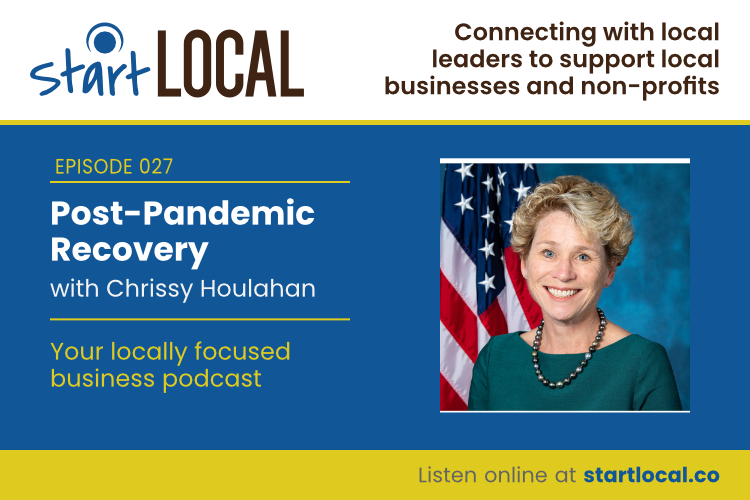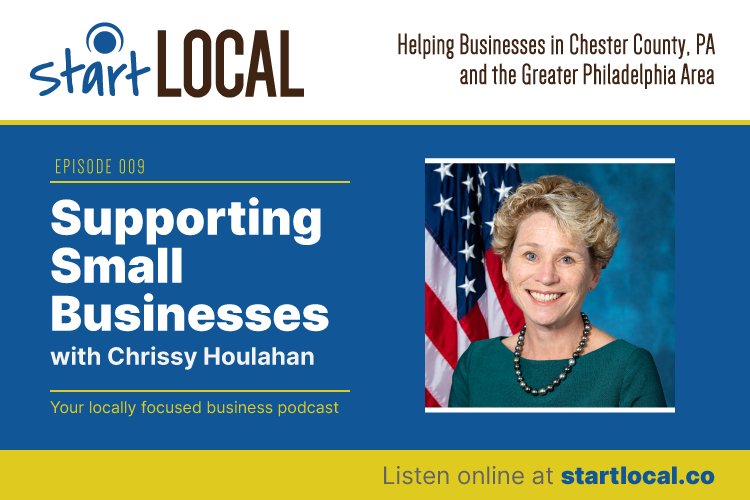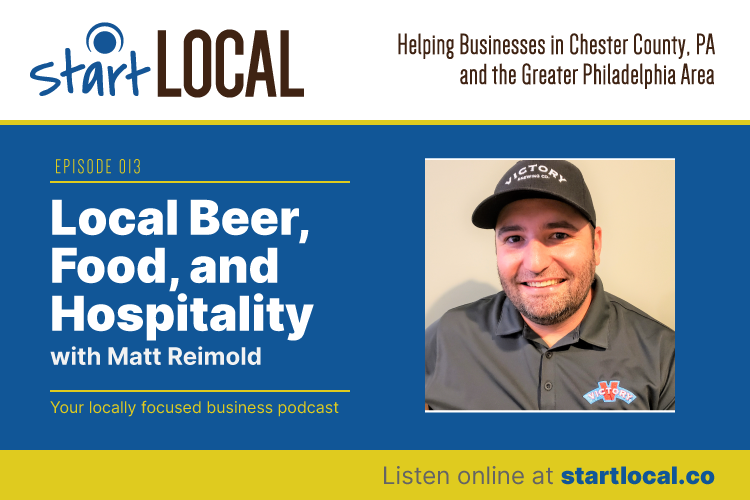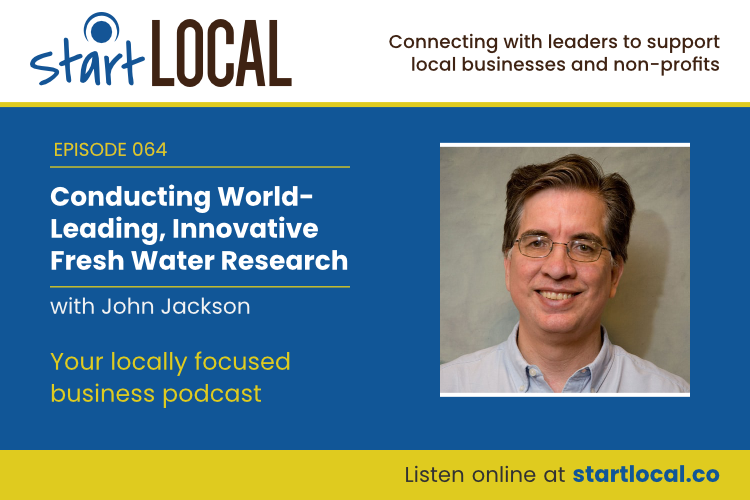
Podcast published: June 2, 2023
Start Local is back, and we have a fantastic guest! Representative Chrissy Houlahan joins us to give us an update on post-pandemic recovery for small businesses in the Pennsylvania 6th Congressional District. We also discuss the Women Owned Small Business Program Transparency Act, resources available to struggling small businesses, and Congress’ efforts to combat inflation. Join us as we explore the challenges and opportunities for small businesses in Chester County, PA and the surrounding region!
Links
- Rep. Houlahan’s official website
- Facebook: @RepChrissyHoulahan
- Instagram: @RepChrissyHoulahan
- Twitter: @RepHoulahan
- Women Owned Small Business Transparency Act
- SCORE Chester and Delaware Counties
- SCORE Berks and Schuylkill City
- Small Business Development Center at Kutztown University
- Small Business Development Center – Exton
- Small Business Development Center – Reading
- Small Business Development Center – Coatesville
Liam Dempsey: Welcome to Start Local, where we talk with business owners, leaders of nonprofits, and other members of our community focused on doing business in and around Chester County, Pennsylvania. Each episode will provide insight into the local business scene and tell you about opportunities to connect with and support businesses and nonprofits in your local area.
Today, we are joined by representative Chrissy Houlahan. Congresswoman Houlahan represents Pennsylvania’s Congressional District, which includes all of Chester County and a little bit of Berks County just to the north.
Representative Houlahan joined us back in June of 2020 where she told us about what the federal government was doing to support local small businesses.
Today, we’ll hear about what’s been happening since the pandemic. And how she and her office and the federal government more generally is working to support our local business community.
Joe Casabona: Representative Houlahan, the last time we spoke it was at the height of the pandemic. What has recovery been like for businesses and organizations, and how has the turmoil in the banking sector, and the impact of rising inflation affected recovery?
Chrissy Houlahan: Those are a lot of questions.
Joe Casabona: Yeah. One at a time.
Chrissy Houlahan: Well, let’s try and parse them out into some individual conversations.
The first one is, you know, how is the Pennsylvania economy and our, you know, South Eastern Pennsylvania part of the economy coming along. And, you know, I think that what I can say is, it’s mixed. This has obviously been an enormous stressor to our economy. The pandemic and a lot of the other things that are going on in Ukraine and other places. So,I can give you a little bit of data.
In 2021, in 2020, small businesses accounted for 33,208 job openings. And now, the data that I have from March of 2021 is that there are 28,355 closings. So, to be clear with that. There are 33,000 or worth 33,000 roughly businesses that were opening, and then there were 28,000 roughly businesses that were closing over that period of time. So a net gain of 4,835 businesses.
So that’s good news and bad news. Of course, we know that small businesses are some of the most fragile businesses in the country that many, many businesses don’t make it past their fifth year. And I can tell you that based on personal experience with several businesses that I’ve grown and operated in the local area, we also saw a net decrease over that period of time of jobs that were available through those small businesses of 166,000 jobs. So this is kind of a mixed bag. More businesses are opening than are closing and many of them are lasting through what is a very difficult time. But the job impact is still something that we need to be concerned about.
On a nationwide level, in terms of what’s going on there, we’ve been seeing some really interesting things going on. A lot more applications for new businesses and new companies than we have historically seen. It is almost kind of, it doesn’t defy logic, but it kind of makes some amount of sense when you have a stressor, like a pandemic, you see some innovation in businesses that you wouldn’t have probably normally seen.
And I think we’ve seen that where a lot of businesses that have existed in the past have to pivot and change their business models pretty significantly. But it also creates opportunity and ideas for other businesses to just start something completely new. Whether we’ve maybe seen an increase in telehealth is an example or innovations and how we take care of our workforce when they’re more at home than they are, you know, at work in their workplaces. And so we are seeing some mixed results as well on the nationwide scale.
You also asked me, and I’ll stop for a second because that’s kind of one of your first questions, have we kind of covered that area a little bit and can we, should we move on to maybe inflation?
Joe Casabona: Yeah. Absolutely. And that was great. It makes perfect sense. And I’m glad to hear that, you know, as a small business owner who’s in his seventh year, I’m glad more small businesses are lasting longer.
Chrissy Houlahan: Yeah. And that’s, you know, kind of trying to make it through that fifth year is always the test of a business and its ability to find a market. And also find the capital that they need to be able to be sustained. So, congratulations on seven years. That’s really very important.
In terms of inflation, inflation still remains, you know, an issue in not only our community and our commonwealth, but in the country and frankly across the world as well. Nations and nation states are seeing this issue as well as local economies. So we are working on that issue here in our community as well as across the globe.
One of the things that I’ve done personally within our, the capacity of our office is that I’m part of something that is an inflation action group, or inflation working group. And we’ve created an action plan of what we should be doing. Not only what have we already done in terms of some of the legislation that we’ve passed and sort of some of the ways that we can help our state and local economies, but also frankly, what we should still do.
So some of those things that you’ve seen pass in congress recently, Inflation Reduction Act is one of them which speaks to changes in our reliance on other people’s energy, as an example. The infrastructure and Jobs Act, which is quite a huge infra investment in exactly what it sounds like hard infrastructure, like bridges and roads and tunnels and those kinds of things, which of course create jobs in and of themselves, but also create opportunities for people to get to and from their jobs more effectively, which is very, very important in our part of Pennsylvania.
The sixth Congressional district really struggles with the fact that we have a very, very low unemployment rate In the three or something percent. And many, many jobs that are open, were that are seeking both high skilled and lower skilled people to serve in them. But those high and lower skilled people are struggling with being able to either afford our community or transit between different places where people can live and places where the jobs are.
And then finally, the Chips Act, is another one of those recommendations of that working group on inflation that we were able to push forward. This has to do with making sure that we bring more manufacturing jobs home, specifically in the chips industry as an example, so that we can have our manufacturing base less reliant on places like China and like Taiwan and more resilient in terms of the pricing hiccups that we’ve been seeing, large hiccups that we’ve been seeing. So, I think that was one of your questions as well, correct?
Joe Casabona: Yeah. Yes, absolutely.
Chrissy Houlahan: And then I think your last question, or kind of area was about the banking industry and the banking crisis which again, is another stressor on our economy that sent some shockwaves through our country and as well the global markets too. And I think what we saw with that particular stressor with Silicon Valley Bank and the Signature Bank has largely been identified as being not a systemic issue and somewhat isolated issues, but it has definitely been a clarion call and a wake up call to make sure that we’re paying attention to regulations and regulatory issues and trying to make sure that we are protecting the depositors in these kinds of situations.
So in terms of what our office has done and what I’ve done in the wake of the Silicon Valley Bank, there are some superpowers that members of congress have, which seems sort of interesting on the outside, but are actually fairly important on the global market sign side. I signed a bipartisan letter to our financial regulators and to the treasury Department urging them to make sure that they did protect those depositors and to prevent runs on other banks that would potentially have those kinds of circular implications or kind of a residual implications.
I also met with our banking industry, our credit unions and our banking representatives in our community to talk to them about how they had experienced this particular inflection point, and whether there was something that we could be doing to be more helpful to make sure that we stabilize the markets and stabilize their industry as well.
And I also became co-chair. I mentioned the working group that was on inflation that was part of the new Dems, the new Democratic coalition that is a pro business and pro opportunity group here in Congress. But I also stood up and became co-chair of a new group that is on economic growth and fiscal responsibility as a result of the Silicon Valley Bank experience.
And lastly, I’m part of a group that’s called, that’s part of the problem solvers. And the problem solvers is a bipartisan group in Congress. It’s called a Noah’s Arc Caucus. And that means that each democrat and Republican join together. So you sort of join in pairs. And this group has a small working group that I’m also part of that is working on the fiscal responsibility and also whether the debt limit and making sure that we don’t default on our debt responsibilities. So that’s kind of what I’ve been working on.
Joe Casabona: Awesome. And well, thank you very much. That way we hit you with a bunch of questions and you handled them like a pro.
Liam Dempsey: Yeah. You sure did. And, you know, it’s clear that you’re doing a ton and I’m very grateful to you for that. Certainly, bank with a small local bank and I got all sorts of emails from my bank saying we’re okay. We’re okay. We’re okay. But knowing that you and your colleague were doing something to make sure that they were okay, was great. Thank you for that. I want to turn your attention if I can, to the women-owned small business program transparency acts, can you tell us a little bit more about that?
Chrissy Houlahan: Sure. And this is a piece of legislation. Remember our schoolhouse rock where you, every two years we start over again, right?
Liam Dempsey: Mm-hmm.
Chrissy Houlahan: And the, I’m just a bill, just an ordinary bill cartoon that you might remember from growing up.
Liam Dempsey: Of course. Of course.
Chrissy Houlahan: So every two years, the clock starts over again. This piece of legislation, the Women Owned Small Business Program Transparency Act, which is quite a mouthful, was introduced last Congress. So, the one that ended in January of this year, and it was introduced by me and representative Claudia Tenney, who’s a Republican from the state of New York.
So it’s a bipartisan piece of legislation. It was introduced to the small business committee at that point in time. And it has several purposes. It tries to make sure that we’re understanding what percentage of businesses are actually women owned and operated that are getting government contracts because there is actually a mandate, a piece of legislation that has mandated that 5% of government contracts are in fact given to women-owned businesses.
The reality is a census, this piece of legislation has been passed. It has only happened twice in history that 5% has actually been hit or met. So this piece of legislation is trying to figure out why are we not able to hit our 5% targets to make sure we’re tracking the amount of dollars, the number of companies that are actually getting resources and making sure there’s no fraud there to make sure that they are genuinely women-owned businesses. Making sure that we are letting people know that these programs exist, and that they have opportunities to be part of these programs. And so that piece of legislation as I mentioned, was introduced bipartisanaly. Last Congress we will be reintroducing it again. This Congress very shortly, trying to hope that we can make it run through the entire, not just the the small business committee, but of course to the floor for a vote of the House of Representatives.
And then there is a parallel piece of legislation. Also bipartisan on the Senate side of things that would also need to get itself through there so that it could marry up with its companion piece on the house side and become a law that the president could in fact sign.
I’m really, really glad that this particular piece of legislation was included in the National Women Business Conference 2022. Annual Report to Congress as having been a notable piece of legislation, and that hopefully is sort of an elevation of sorts to let people know that this should be given another round of chances. You know, this piece of this Congress that we’re in right now.
Liam Dempsey: Thank you.
Joe Casabona: Awesome. And I know that we’re coming up on time here. I did want to ask about, you know, we’re hearing about the challenges to adjust the federal government’s debt ceiling. How will small businesses be affected if something is or is not done about the debt ceiling?
Chrissy Houlahan: We have to do something about the debt ceiling. And the sense of urgency is palpable here in Congress. We, I serve and represent Pennsylvania six, which is a really purple community. It’s sort of equally divided pen, Republicans and Democrats and independents. And as we’ve been talking about a lot of small businesses and a lot of people frankly, who just have, you know, jobs. And economy really depends on us being responsible to servicing the debt that we’ve accrued. Those are the rules. You know, you have to pay for things that you’ve bought, and we all kind of understand that. I am hopeful that we will be able to find some sort of a path to agreeing to how to do this and doing it relatively quickly because the financial markets of our country as well as of the world are watching us.
As a matter of fact, you mentioned that I’m gonna be heading off to a vote right now. It will be a vote on a piece of a proposal of how to manage this. And unfortunately I’m not terribly convinced that this is a very serious proposal. And so I will be voting ‘No’ on this particular effort because some of the things that have been put forward are significant cuts, as an example to the IRS.
And one of the ways that we can generate revenue here is to make sure that we have responsible people can call the IRS and get answered, literally answered the phone call, their phone calls. It also cuts pretty significantly some of the things that I think our country depends upon like Meals on Wheels and food programs that I think we are a better country than that to try to think about connecting, servicing the debt with cutting things like this.
It also hurts our veterans. Aand I am a veteran, and my family are veterans and many of us have served our country. And we deserve, and they deserve to be treated better than to attach fiscal responsibility in the past to cuts in the future on these particular issues. So, we need to be very, very gravely serious about this. I believe that President Biden should sit down with Mr. McCarthy, with leader speaker McCarthy. I believe that that’s the right thing to do because grownups should be in the same room talking about these things. But I don’t necessarily think that this particular proposal that’s on the table right now is a serious one.
Joe Casabona: Thank you.
Liam Dempsey: Thank you for that. We have only…
Chrissy Houlahan: If it’s okay, I’d also like to add one other thing, which is…
Liam Dempsey: That’s exactly where we’re gonna go. We don’t have much time. Is there anything we haven’t covered that you would like to share with us, please?
Chrissy Houlahan: One, one other thing we’re related to the debt.
Liam Dempsey: Oh, please do. Please do.
Chrissy Houlahan: Yeah. There is, as I mentioned, this group, the problem solvers and the problem solvers have a sub working group as well that has to do with what will we do if for whatever reason, President Biden and Speaker McCarthy cannot find some, you know, compromise. At least we are trying to make sure that we’re working together across the aisle to figure out what would be the straw man of something that we would be interested in doing together. And so I think that that’s something that’s really important to highlight is that there are grownups and we are working to try to find a solution to this really important pressing problem.
The last thing that you asked is if there’s anything else to, you know, to talk about. I really do want to make sure that the people in our community know that there’s a lot of resources out there for small businesses. Whether they’re women-owned or veteran owned, or minority owned, or just just plain small businesses. There are lots of different organizations in our community to help us out on that.
We have something that’s called Score Chapters. And Score Chapters provide a lot of mentoring resources and help in our 50 states and all of our territories. And we have one in Chester County and in Berks County.
We also have the Small Business Development Center, which is in Pennsylvania. A group that helps our small businesses and our nationally accredited programs that help provide educational training and business resources and those kinds of things at no cost to, you know, businesses. And had I known about this when I was a young entrepreneur, I think I might’ve found it useful to help with things like business plans and operationalizing, you know, our ideas.
There’s also a bunch of SBDC centers across our area, including some at the Kutztown University in Exton and Coatesville, and Redding as well. And so I would encourage people to understand how to access the SBDC’s as well.
And then lastly, as we talked about particularly passionate about women businesses, and veteran-owned businesses, because I am both a woman and a veteran. So remember that there are veteran business outreach centers that are important and reliable to be able to help our veterans and service, disabled veterans to help in their businesses. And these women business centers will of course help female entrepreneurs specifically. And that’s something that I think is really, really important as well as we’re building out, and reflecting the diversity of our community in our businesses themselves.
And that’s about it. I hope I’ve covered most of the things that you guys would like to talk about.
Liam Dempsey: You are very skilled at answering a lot of questions very succinctly, very quickly. Thank you, Congresswoman, for your time this afternoon. We really appreciate it.
Chrissy Houlahan: Of course. Thanks so much. Appreciate you guys very much.
Joe Casabona: Thanks again so much to Representative Chrissy Houlahan for joining us for this fantastic episode.
So we are back. And so thank you for listening to this. If you wanna make sure you get every episode of Start local, you can subscribe in whatever podcast app you prefer to listen to or you can head over to [startlocal.co]. There, you’ll find all the places you can find our podcast, as well as links and relevant notes for every episode.
Thanks so much for listening. And until next time. we’ll see you out there in Chester County.



